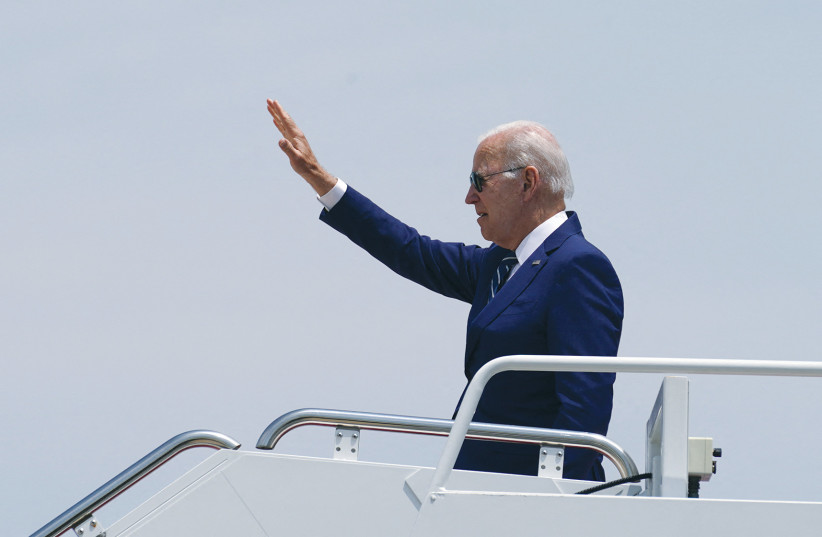US pundits are currently pondering a picture the US president hopes to avoid: a handshake with Mohammed bin Salman, Saudi Arabia’s de facto ruler. According to the CIA, MBS, as the crown-prince is known, was behind the grizzly murder and dismemberment of the journalist Jamal Khashoggi. US President Joe Biden, who promised a US foreign policy guided by the values of democracy and human rights, shunned MBS and branded him a “pariah.” But now, a string of strategic considerations has led Biden to embark on a pilgrimage to Riyadh.
The American interest requires doing business with the young MBS, who is expected to rule Saudi Arabia for many years to come. For Washington, a country that controls vast oil reserves must not fall into the sphere of influence of Russia or China, especially as the great powers competition has intensified in the wake of the Russian invasion of Ukraine.
Biden wants Saudi Arabia to increase oil production to stem rising energy prices. With great alarm, he sees inflation wrecking his approval ratings and the impending global economic downturn hangs above his head like a political sword of Damocles.
Biden’s visit to Saudi Arabia raises the gloomy truth about the place of moral considerations in foreign policy, an issue that was recently discussed at a conference held by the Jewish People Policy Institute. The various speakers debated the proper conduct the tragic history of our people obliges us to.
The discussion sharpened two opposing perceptions: there are those who find in this dreadful history – exile, pogroms, the Holocaust, an unending war over our very existence as a sovereign state – license to worry first and foremost about ourselves. Others conclude the exact opposite, that it is our duty to be especially attentive to the suffering of others. In so doing, they argue, we preserve our unique identity and strengthen our resilience as a nation.

The controversy becomes even more complicated because the whole notion of “morality” is elusive, and its translation into a practical foreign policy is far from self-evident. Shortly after the attack on the Twin Towers, former president Bill Clinton told then-foreign minister Shimon Peres in my presence that he had decided not to order the killing of bin Laden when he was spotted from the air because he was surrounded by dozens of innocents. The moral consideration had prevailed but after the horrific attacks, Clinton admitted that he was no longer convinced he had made the right choice.
Biden’s expected visit to Saudi Arabia shows that even a great power like the United States cannot be guided by moral considerations alone. It is therefore a question of measure: at what point on the continuum between “realism” and “idealism” does a state choose to place itself? This quandary has nettled thinkers since the dawn of history. How and to what extent is Israel struggling with this dilemma?
An examination of the OECD countries’ international aid data as a percentage of gross national income (GNI) shows that Israel lags at the bottom of the list. We rationalize this unflattering figure by citing the heavy price of security reality imposes upon us. Indeed, Israel’s overall geopolitical situation, to say nothing of the violence of its own neighborhood, is pushing it farther away from the “idealistic” pole of the continuum.
WHEN CONFLICT is perceived as existential, there is a tendency to place full blame on the other and attribute full justice to oneself. The propagandistic ethos also pervades foreign policy logic: in our own eyes, our conduct is eternally ethical. When issues that invoke moral consideration – apartheid in the South Africa, recognition of the Armenian genocide, the Russian invasion of Ukraine – ethics are pushed aside by the calculus of security or economic interests.
To this, one must add the Israeli occupation of the Palestinians. Israeli foreign policy is rooted in and captive to a moral problem: the fate of another people, precluded from choosing the government that determines its future, has been in our hands for decades.
This grim picture is not going to change anytime soon. The Middle East will continue to be a violent and anarchic neighborhood, the occupation will not vanish tomorrow, antisemitism is unlikely to dissipate, the sense that “the whole world is against us” will retain its currency, and Israeli public opinion will not pressure the government to grant more weight to moral considerations. And Israel – politically and demographically – is not becoming more liberal, quite the contrary.
So, what’s left? When trends do not herald a turnaround and institutional systems remain indifferent, what is left are flesh and blood people, those who happen to be at the decision points. They know that Israel is significantly stronger than in the past and therefore has greater leeway to take moral considerations more seriously.
At the moment of truth, the variable that makes the difference is the moral education those who make fateful decisions on our behalf received in their parents’ home. Did what they learned in their distant school days about the rebukes of our prophets settle in their hearts?
The writer is a senior fellow at the Jewish People Policy Institute and a former director-general of the Ministry of Foreign Affairs. His new novel Toronto Junction was recently published by 2sfarim-publishing.
